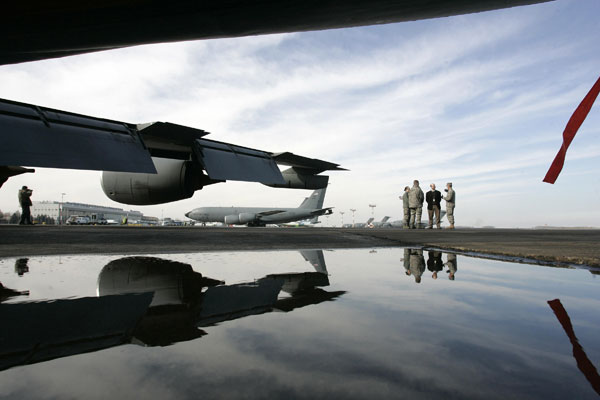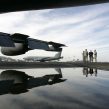
Uncertainty Continues to Surround Future of U.S. Air Base
Publication: Eurasia Daily Monitor Volume: 6 Issue: 40
By:

The Kyrgyz government announced that August 18, 2009, would be the final day for the U.S. base’s functioning at Manas Airport (www.akipress.kg, February 24). Despite intense criticism from the international community, the Kyrgyz leadership seems is determined to shut down the base as soon as possible. A closer look at the dynamics inside the Kyrgyz government, however, reveals that President Kurmanbek Bakiyev and his closest allies remain hopeful of a better bargain from the United States.
Most analysts, including those from Jamestown, have been accusing Russia of pressuring Bakiyev to evict the United States from the base. While this view is valid, it is also important to remember that the Bakiyev government has been conducting politics for the highest possible returns, searching for the better bargain from the United States or Russia. In the past Bakiyev was able to jack up U.S. payments significantly for the lease on Manas Airport. He, reportedly with Daniyar Usenov, the head of his administration, has been seeking additional income from both the United States and Moscow.
Jamestown’s sources confirm that Kyrgyz politicians informally demanded that the U.S. embassy in Bishkek increase the rent and finance several lucrative projects in Kyrgyzstan. While hard evidence of these demands from the Kyrgyz side is not available, Bakiyev and Usenov allegedly sought a sum almost equal to the one recently promised by Russia, that is, close to $2 billion and a write off of Kyrgyzstan’s debt.
After unsuccessful bargaining, the Kyrgyz regime moved aggressively toward a parliamentary vote, and Bakiyev signed the bill into law. But Kyrgyzstan’s incentive to obtain a better deal shows that Bakiyev pursued his personal interests in evicting the U.S. base.
Because of these speculations, it is possible to predict that Bakiyev’s bargaining will continue and his February 19 decision to shut down the base is not final. There are several ways in which the situation might evolve. As one international expert commented to Jamestown, "It is not in Russia’s interest to have Kyrgyzstan bargaining for the base, and Moscow prefers to have the base shut down soon." Whatever the outcome of Bakiyev’s actions, he will remain the main beneficiary of clashing Russian and U.S. interests on his territory.
Bakiyev wants to be reelected for a second term, and discussions about the date for the next elections are intensifying in the parliament and government. Bakiyev realizes that if he ultimately evicts the U.S. base, he might attract greater criticism from Washington. The president’s current use of security structures to preempt opposition forces from mobilizing against his regime is unprecedented in Kyrgyzstan. In addition to the Ministry of the Interior and the Prosecutor-General, which have traditionally been used to intimidate opposition leaders, the Defense Ministry is becoming increasingly involved in controlling domestic developments.
Kyrgyz politicians are presenting Russia’s $1.7 billion investment in the Kambarata hydropower plant as a sign of strengthening relations between Bishkek and Moscow. Russia is depicted as a savior during difficult economic times, while the United States is a destabilizing force. The Russian investment is being praised, and it goes without saying that the Kyrgyz government has prevented a transparent investment climate that might encourage other backers from becoming involved in the hydropower sector.
Meanwhile, during a visit to Bishkek EU Special Representative for Central Asia Ambassador Pierre Morel noted that the EU was ready to finance projects in the hydroelectric sector. Morel said that the future of the sector’s development would affect the wider Central Asian region as well and there was a need for fresh thinking about the sector’s development. The ambassador also proposed holding public discussions between the EU and Kyrgyz experts on the repercussions of a shutdown of the U.S. base in Kyrgyzstan (www.24.kg, February 20). Morel pointed out that EU citizens were also fighting in Afghanistan and risking their lives for stability in a greater Central Asia.
At a meeting with Morel, Kyrgyz Prime Minister Igor Chudinov expressed his hope that the EU and Kyrgyzstan would build stronger relations in trade and tourism. The Kyrgyz parliament has been delaying a vote on canceling an agreement with the remaining 11 member states of the Enduring Freedom anti-terrorism coalition, which includes Denmark, France, Italy, Netherlands, New Zealand, Poland, and Spain. Both Chudinov and parliament realize that breaking relations with these countries might affect other aspects of Kyrgyzstan’s cooperation with EU as well.




